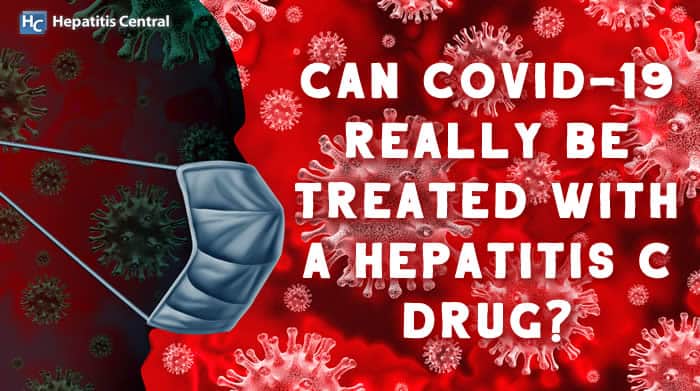Can COVID-19 Really Be Treated with a Hepatitis C Drug?


According to the World Health Organization, COVID-19 has impacted over 132 million people worldwide (as of April 2021) (1). Of those 132 million, approximately 13 million cases are located in India. India is starting to see a surge in cases and sits at the third highest caseloads behind the U.S. and Brazil.
One of the leading pharmaceutical companies in India, called Cadila Healthcare Ltd, just received approval to treat COVID-19 with a hepatitis C drug.
The Drug and the Outcome
After results of a late-stage trial showed promising results, Cadila Healthcare Ltd was approved to use the drug, Pegylated Interferon alpha-2b (‘PegiHelp’), as a COVID-19 treatment. According to a statement (2) by Cadila, a single dose of the drug, when taken early, helped patients with COVID-19 recover quickly and have limited complications.
According to the clinical trial data (2), about 91% of patients who were given PegiHelp tested negative for COVID-19 by day seven compared to the almost 79% who were given regular COVID-19 care.
The drug was initially launched in India 10 years ago to treat hepatitis C and is now being repurposed to treat COVID-19 due to the increased cases.
Approved U.S. Treatments

According to the CDC (3), the FDA only has one approved drug to treat COVID-19 in the United States called remdesivir (Veklury). This medication is an antiviral created by Gilead Sciences and is given through IV.
A 2020 study published in The New England Journal of Medicine (4) determined the effectiveness of remdesivir with over 1,000 patients. In the study, half received remdesivir while the others got a placebo.
The results found that:
- Patients receiving remdesivir had a median recovery time of 10 days compared to the placebo’s 15 days
- Mortality with remdesivir was 6.7% compared to 11.9% with the placebo by day 15
- By day 29, mortality with remdesivir was 11.4% and placebo was 15.2%
- Serious adverse events occurred in 24.6% of patients receiving remdesivir and 31.6% of patients getting the placebo
Hepatitis C Treatment and Remdesivir
There is current research being done on different drugs combined with remdesivir to further protect against COVID-19. “The data that we have is preliminary — it is in vitro data — but it is very promising, in the sense that, in tissue culture, the synergy is remarkable,” Sarah Stanley, associate professor of infectious diseases and vaccinology at the UC Berkeley School of Public Health, said in an interview (5). “In terms of in vitro work, I haven’t seen anything more promising than what we’ve found, and that is really exciting. But the rubber meets the road in vivo, and we haven’t done that yet.”
The majority of those drugs are actually ones that are used to treat hepatitis C. In fact, one screen showed a combination of 3 different drugs – two being hepatitis C drugs – prevented the virus from infecting human lung cells 25 times better than remdesivir by itself.
The belief is that the combination of these drugs helps to stop the virus from replicating. The goal though is to deliver them in a way that will be able to interfere with the replication process, which needs to occur early on when the virus is multiplying fast. The effectiveness may improve if treatment goes straight to the airways and lungs.
“My vision is to have an inhaler. People would just have it at home proactively, and once you feel something coming on, you just take a puff,” Julia Schaletzky, executive director of UC Berkeley’s Henry Wheeler Center for Emerging and Neglected Diseases (CEND) and its Drug Discovery Center, said in the same interview. “Maybe you could hit it bad enough so that it doesn’t break out into full disease.”
Conclusion
More research needs to be completed to conclude the efficacy and safeness of these drugs.
- WHO coronavirus (COVID-19) Dashboard. (n.d.). Retrieved April 18, 2021, from https://covid19.who.int/
- Cadila seeks nod to REPURPOSE Hepatitis C drug FOR COVID-19 in India. (2021, April 05). Retrieved April 18, 2021, from https://www.reuters.com/article/health-coronavirus-cadila-achealth-idUSKBN2BS05N
- Treatments your healthcare provider might recommend if you are sick. (n.d.). Retrieved April 18, 2021, from https://www.cdc.gov/coronavirus/2019-ncov/your-health/treatments-for-severe-illness.html
- Beigel, J. H., Tomashek, K. M., Dodd, L. E., Mehta, A. K., Zingman, B. S., Kalil, A. C., . . . Lane, H. C. (2020). Remdesivir for the treatment of Covid-19 — final report.New England Journal of Medicine, 383(19), 1813-1826. doi:10.1056/nejmoa2007764
- Robert Sanders, M., & Sanders, R. (2021, February 03). Can hepatitis C drugs help remdesivir FIGHT COVID-19? Retrieved April 18, 2021, from https://news.berkeley.edu/2021/02/03/can-hepatitis-c-drugs-help-remdesiver-fight-covid-19/







